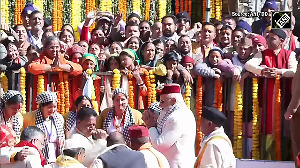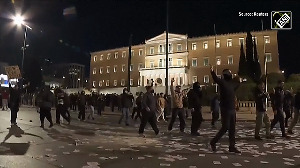Despite Ravi Teja's relentless energy, the drama is bogged down by tedious emotional beats, observes Mayur Sanap.

Ravi Teja is a formidable star within the Telugu film industry who has made a comfortable space for himself with his crowd-pleasing comedy and action outings.
The actor, who goes by the moniker 'Mass Maharaja', has been busy playing anti-hero characters of late which can be seen as his reinvention in the mainstream space.
In Tiger Nageswara Rao, Ravi goes one step ahead from his last film Ravanasura and gleefully plays this larger-than-life character that perfectly compliments his superstar image.
But under Vamsee's direction, what we see in Tiger is this stylised exercise in hero worship that fails to yield any exciting results.
Set in 1970, the narrative starts off with dramatic urgency where DSP Vishwanath Sastry (Murali Sharma) is called to Delhi by IB officer Raghavendra Rajput (Anupam Kher). They want to nab Andhra Pradesh's notorious criminal Tiger Nageswara Rao (Ravi Teja), who could be a threat to the prime minister's safety.
The film then goes into flashback and unfolds the events that led Rao take down a path of villainy and what makes him the messiah for his people.
The screenplay, written by Vamsee, is a haphazardly plotted series of life events which tells us what makes Rao a modern day Robin Hood. But this backstory is so devoid of emotional depth that we never really feel for our protagonist.
In the initial minutes of the three hour-long film, we see the promise of a gripping action adventure, but the film plays safe and sticks to its masala template.
Ravi Teja is visibly having a gala time in his star vehicle.
He does his brooding hero avatar quite well, benefitting amply from his signature style. His body language, intense gaze, action and dance moves are treat to watch for fans.
But it is baffling to see a star of his stature resorting to excessive degree of violence, especially against women.
The women of the film -- Nupur Sanon, Gayatri Bharadwaj and Anukeerthy Vas -- are nothing but damsels in distress who need to be rescued by the hero. The love angle between him and Nupur is especially jarring and turns out to be quite forced and doesn't add much value to the story.
Few action sequences choreographed in the film need a special mention.
The train episode which comes in the hero-introductory scene and the bloodbath that takes place in the factory are goosebumps-inducing moments.
Being a period drama, the film is visually appealing, although the clunky VFX in a few scenes does play a spoilsport.
Despite Ravi Teja's relentless energy, the drama is bogged down by the tedious emotional beats in its dramatic moments. In its final stretch, when the film wants you to be moved, you only feel exasperated.













 © 2025
© 2025